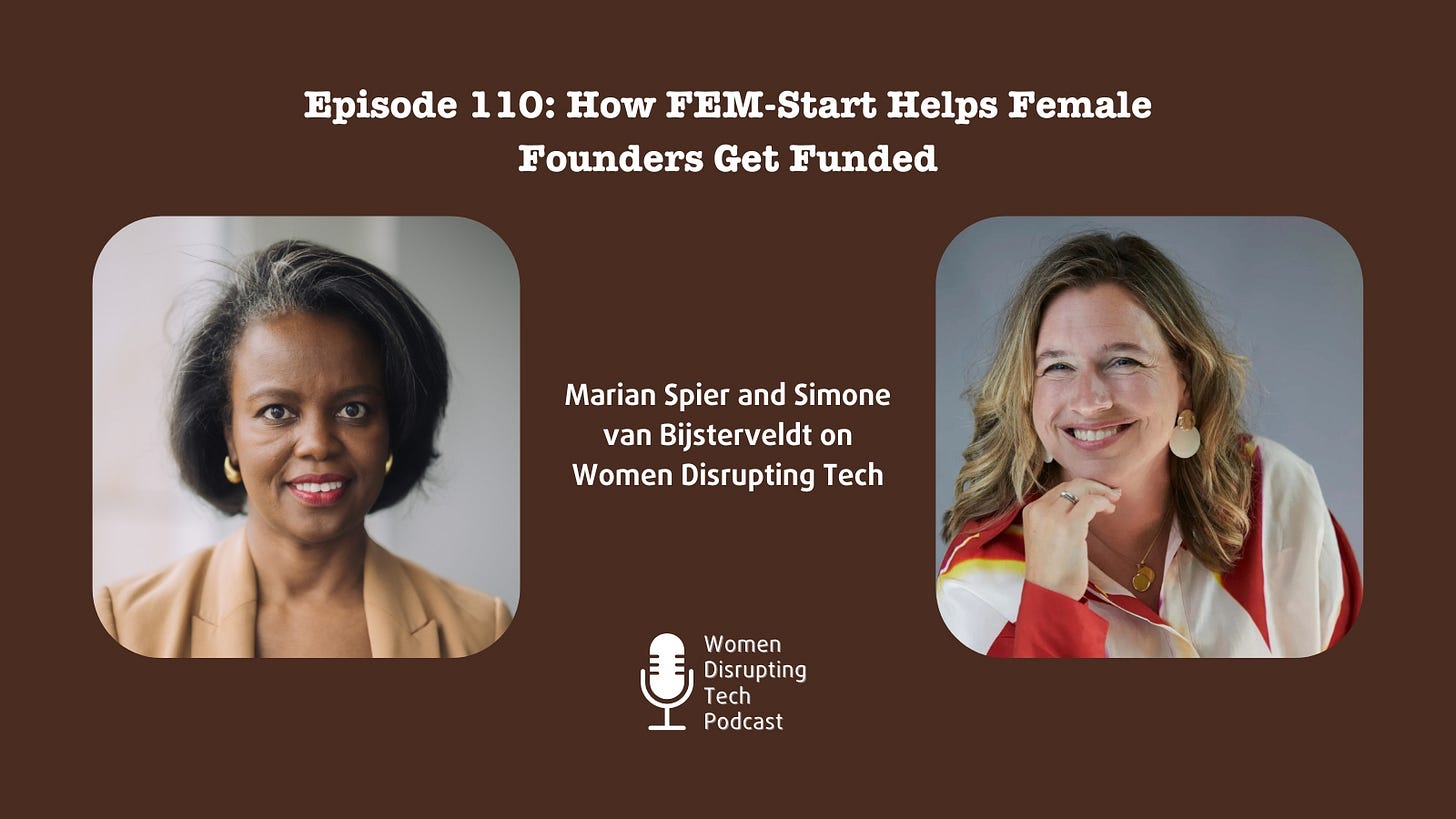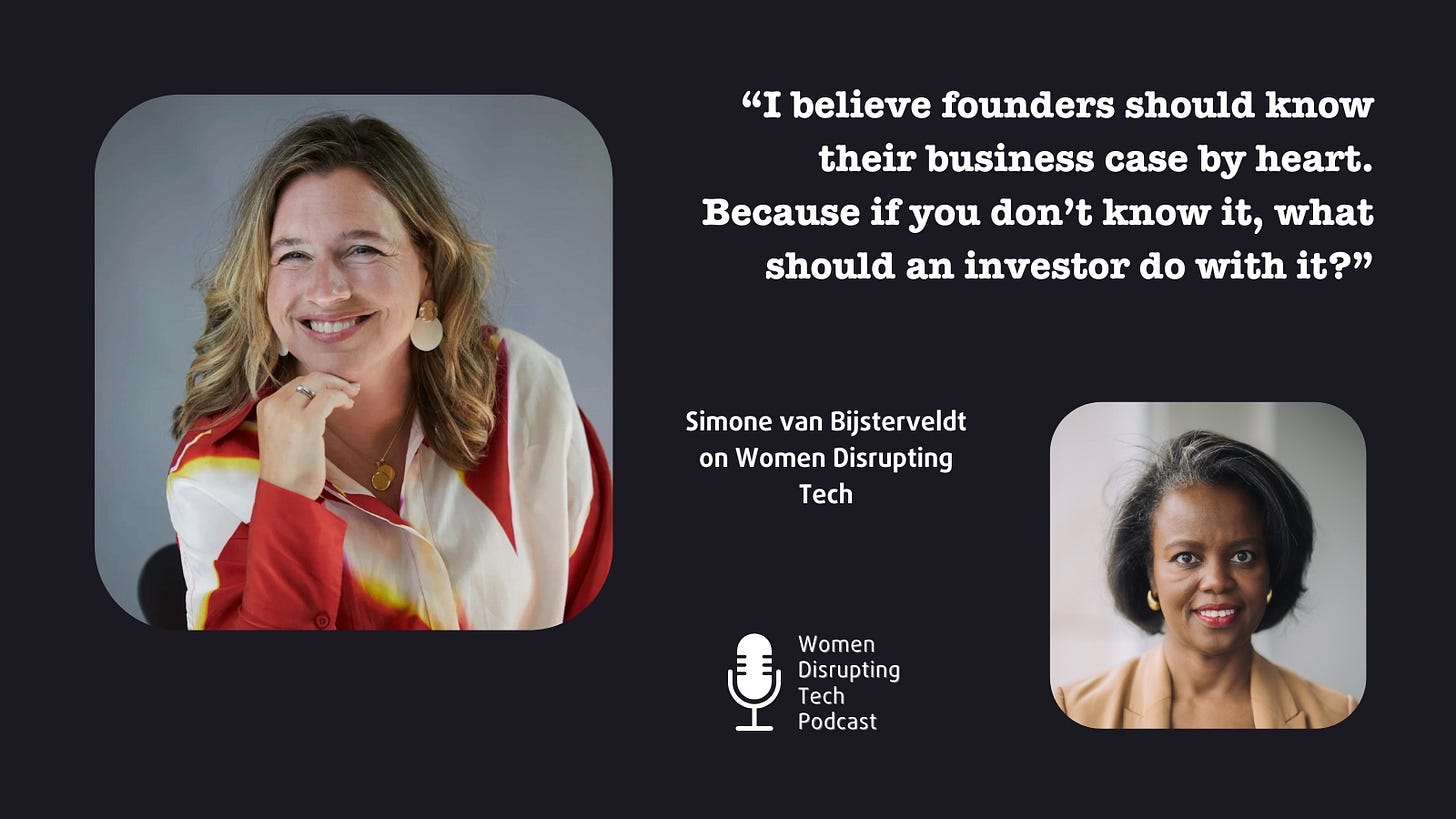What if we stopped asking women to change, and started changing how the system works?
In this episode, FEM-Start co-founders Marian Spier and Simone van Bijsterveldt explain what still keeps female founders from raising capital—and what needs to happen next.
Whether you’re fundraising for your first round or mentoring someone who is, this conversation is a must-listen.
Three Key Takeaways From This Episode
FEM-Start isn’t just a training for female entrepreneurs. It’s a mindset shift. A platform. A response to structural bias. And a roadmap for change.
1. Visibility leads to funding
Investors need a certain level of FOMO. If female founders aren’t visible in the press or at events, they’re more likely to be overlooked. Visibility isn’t vanity, it’s strategy.
2. Modesty isn’t the issue; bias is
Women often present more realistic forecasts. That’s not a lack of ambition. That’s clarity. The problem isn’t the pitch. It’s how investors judge it.
3. Access still isn’t equal
Even when women ask for a meeting, they often don’t get a reply from investors. FEM-Start gives them the tools to open doors and make the most of the opportunity when they get there.
👉 Know a female founder or an ally who needs to hear this? Share this post with them.
What else do we talk about in episode 110 of Women Disrupting Tech?
02:30 Founding FEM-Start: The Journey
05:16 Navigating Challenges During COVID-19
08:23 Barriers for Female Entrepreneurs
11:31 The Importance of Visibility and Networking
14:18 Investor Bias and Its Impact
17:25 Educating Female Entrepreneurs
20:11 Confidence in Pitching
23:23 The Role of Bias in Investment Decisions
26:01 Changing the Narrative Around Female Founders
29:04 Myths About Female Entrepreneurs
32:03 The Future of Gender Diversity in Business
33:39 Gender Bias in Leadership and Promotion
36:13 Education Gaps for Women Entrepreneurs
42:07 The Role of FEM-Start in Entrepreneurial Growth
43:47 Personal Experiences Shaping Entrepreneurial Journeys
47:24 Understanding Financial Literacy for Entrepreneurs
52:45 Future Aspirations for FEM-Start
1:00:30 Advocating for Inclusion in Tech Funding
Links to the episode on other platforms:
You can listen to How FEM-Start Helps Female Founders Get Funded on Spotify, Apple, and YouTube.
Three Reasons Why Female Founders Should Listen
This episode gives you more than advice. It gives you language, mindset, and courage.
1. Marian and Simone name what others only hint at
From investor bias to financial blind spots, Marian and Simone speak with clarity and care about the real challenges female founders face.
2. They offer tools and experience
You’ll learn from two leaders who have seen it all what’s in their programs, and why understanding investor “lingo” is a power move.
3. It reminds you not to shrink
You don’t need to change who you are to get funding. In fact, investors should choose you. So you do need to be prepared. This episode shows you how to stay authentic and still win the pitch.
🎧 Ready to hear it? Listen to Episode 110 on Spotify, Apple, or YouTube.
Three Pieces of Practical Advice for Female Founders
Taken straight from the FEM-Start playbook, here are three pieces of practical advice for female founders:
1. Know your finances by heart
Investors want founders who understand their numbers. Not just the P&L, but also cash flow, forecasting, and what’s driving growth.
2. Learn the language of funding
Terms like “pre-seed,” “valuation,” and “cap table” are more than buzzwords. Knowing the VC lingo helps you negotiate from strength, not guesswork.
3. Build your pitch like a marriage
Don’t play a role just to impress. The investor-founder relationship is long-term. Be honest from the start. You’ll attract better partners.
🎙️ Which of these have you already mastered? Share your experience in the comments.
Bonus Insight for Investors
Bias training won’t fix the gap. But behavior can.
About 24 minutes into the conversation, Marian says something important: the system won’t change because people suddenly become less biased. It will change because more women are building companies too big to ignore.
That is why it's important to expand the lens through which we evaluate potential. And asking better questions, to women and men.
Coming up on Women Disrupting Tech
Next week on Women Disrupting Tech, I’m joined by Emily van Putten. She shares her personal experiences as a transgender woman in tech, the impact of online identity, and the necessity of accountability in leadership.
Talking about leadership, Emily has a clear view on what inclusive leadership is and isn’t. Just click to hear it…
So stay tuned for this and much more on Women Disrupting Tech. And until the next episode: Keep Being Awesome!
Dirkjan















Share this post